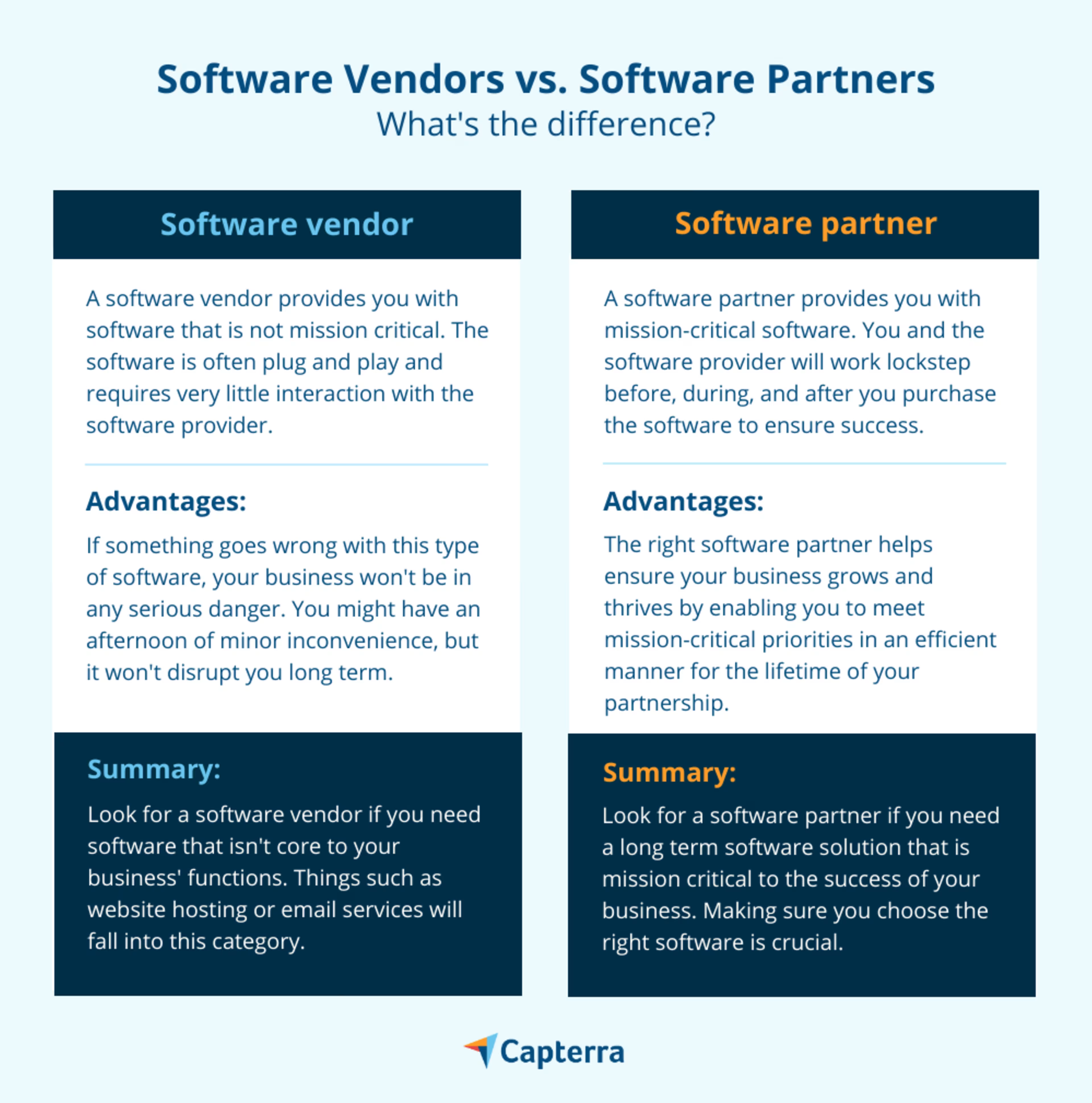Understanding the difference between a software vendor and software partner is crucial when you're looking to make a long term purchase.

The difference between a software vendor and a software partner is conceptual. Yes, all software partners are also software vendors, but not every vendor is going to offer you a partnership alongside the software they sell you.
The type of vendor you need is entirely dependent on what you need out of your software. If that sounds confusing, don’t worry—we’re here to help you determine what type of relationship you need with your software provider.

Software vendor relationships are transactional in nature
In this scenario, think of software vendors as transactionary like a vending machine. You put in a dollar, make your selection, and get your snack. You don’t need to worry how long the chips will last you, and you also know what to expect from them.
Your relationship with a software vendor is similar. Not every piece of software you purchase will be a necessary piece in keeping your business up and running.
For instance, if you need a website, signing up with a web hosting company is as transactional as it can get. They design their software so that you can do most of the heavy lifting yourself, and once you have your website set up, you don’t have to continue to worry about it.
You expect the software to continue to work. If it goes down for an hour, it’s a minor setback, but it won’t shut down your business. You may never talk to a single person from that company, but that’s okay. If the software isn’t mission-critical to your business, it’s totally fine to treat it as transactional.
A software partner is there for your business when you need them
Software partners will work with your business every step of the way to make sure the software they provide will help your business thrive. When it comes to finding a software partner, you’re going to want to focus on a few things:
Make sure the software provider’s business goals align with yours
Excellent customer service and support
Future technology
Your software partner should help you achieve your goals
You wouldn’t want to trust your business to someone who doesn’t share the same vision or goals as you, so who you trust with your mission-critical software should be no different. Remember that software is often a years-long partnership, so it’s important that the software provider is equally excited and devoted to the partnership as you are when you’re searching for the right choice.
If your potential software partner’s entire mission statement is about helping businesses with a large number of employees and you’re a solo entrepreneur or a team of five, you’ll probably want to focus your attention on partners who help smaller teams.
Asking questions about why they started, what their long term goals are, and how they plan to achieve those goals are great ways to understand whether or not they will be a good fit for you.
Find the software partner that provides excellent support
When it comes to customer service and support, you want to look for a provider who is honest and open about what their software is capable of and how, exactly, it will help your business. Make sure to find out early on what kinds of training they offer to get you and your team up to speed on how to operate the software.
In order to get all the information you need about their support system, ask your potential software partner the following questions:
Do they charge extra for training?
Do they proactively help train your team on software updates that have just been released?
Do they offer training videos?
Do they have customer support available for you to call if you encounter a problem, or do they only provide a help desk?
Are any of the options gated behind a higher pay tier?
Software providers offer a wide range of support and service, so finding the partner that fits your needs best is crucial.
Innovation is key when it comes to software partnerships
You’ve probably already realized that there are hundreds or even thousands of software solutions out there—all you have to do is go to any software market catalog on our site to see that. The unfortunate reality is that not all of these software solutions stick around forever. Sometimes a company will go out of business, which will leave you with a defunct piece of software.
When you’re signing up for software, you’ll want to make sure the software partner you choose is innovating and positioning themselves to be around for as long as you’ll need them.
Not only will it give you confidence that you’re getting cutting-edge software, but it will also increase the lifespan of your partnership and reduce the amount of upgrading or switching you’ll have to do. And trust us when we say that switching software is a costly and time-consuming process.
Finding your software partner is only the first step
Once you’ve found your software partner, you still need to make sure you negotiate a good contract, navigate the tricky implementation process, train yourself or your staff on using the new software, and ensure you’re using the software to the fullest.
To help with that, we’ve got you covered with these great resources: